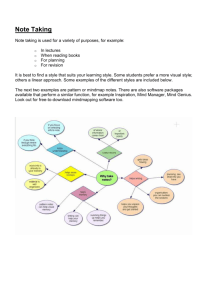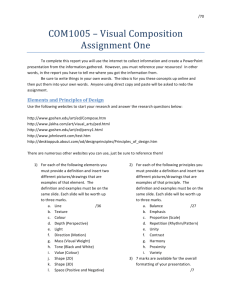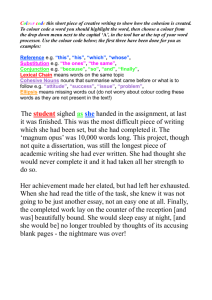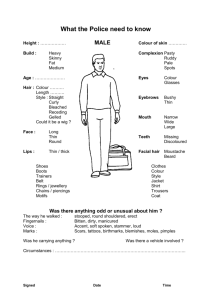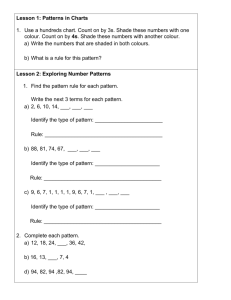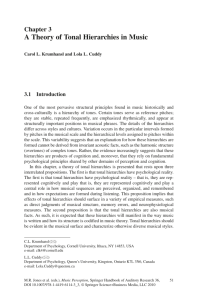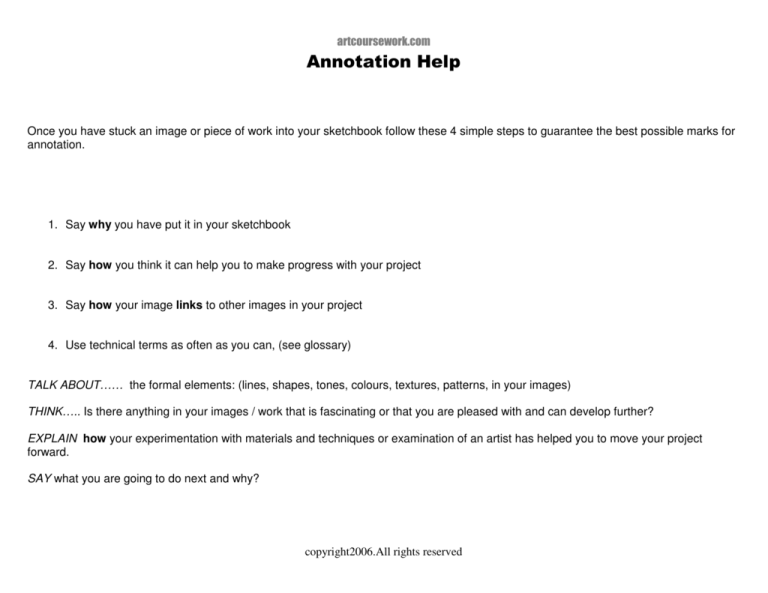
artcoursework.com
Annotation Help
Once you have stuck an image or piece of work into your sketchbook follow these 4 simple steps to guarantee the best possible marks for
annotation.
1. Say why you have put it in your sketchbook
2. Say how you think it can help you to make progress with your project
3. Say how your image links to other images in your project
4. Use technical terms as often as you can, (see glossary)
TALK ABOUT…… the formal elements: (lines, shapes, tones, colours, textures, patterns, in your images)
THINK….. Is there anything in your images / work that is fascinating or that you are pleased with and can develop further?
EXPLAIN how your experimentation with materials and techniques or examination of an artist has helped you to move your project
forward.
SAY what you are going to do next and why?
copyright2006.All rights reserved
artcoursework.com
This glossary is produced to give you some technical terms that will help
you to express your ideas and to understand the work of artists.
Remember using technical terms will get you extra marks!
Composition
(A work of art and it’s pieces)
Foreground front
Backgroun back
Midground middle
Perspective smaller in distance
Distorted
changed/unusual
Ground
painting surface
Harmonious feel calm
Discord
not calm
Rythmn
musical
Abstract
non figurative
Landscape sideways / outside
Portrait
upright / faces
Still life
objects / fruit bowl
Simple
not much in it
Confused too much in it
Figurative human form / objects
Golden section measured / balanced
Elements
parts of pictures
Juxtaposition next to each other
Triptych
three pictures in a row
Diptych
two pictures in a row
Religious Christian, Islamic etc.
Line
(Lines in a work of art)
Convoluting twisting
Converging coming together
Interwoven under & over
Broken
bits
Chevron
tractor tracks
Spiral
helter-skelter
Helix
helter-skelter
Hatched
short diagonal lines
Dotted
dots
Pointillist dots
Fast
thinner / striking
Slow
thicker / rough
Heavy
dark / slow
Light
like a whisper
Curved
bending
Crossing
multi-directional
Diagonal
corner to corner
Vertical
straight up
Horizontal side to side
Stepped
like steps
Twisting
like a coil
Looping
twisting in loops
copyright2006.All rights reserved
Texture
(Way things feel or appear to feel)
Metallic
like metal
Enamel
like teeth
Grated
like grated cheese
Impasto
thick paint
Aggregate crumble
Abrasive
rough
Gloss
shiny
Matt
not shiny
Aqualine
watery
Pearl
smooth like pearls
Rough
not smooth
Smooth
like glass
Splintered like snapped wood
Fluid
moving / wet / cool
Peeling
paint / skin coming off
Orange peel like orange peel
Furry
like a fur coat
Scaly
like skin of a fish
Warm
body temperature
Cold
like ice
Woody
wood like
Powdered covered in powdered
Islamic
related to Islam
Christian
related to Christianity
Buddhist
related to Buddhism
Exotic
cultural - foreign
European from Europe
Western
USA & Europe
Modern
new / 20th century art
Conventional un-original
Symbolic
with additional meaning
Postmodern using styles together
Minimal
less is more
Expressionist emotional / strong colour & marks
Eastern
of the east / China etc.
Mosaic
image made with small tiles of colour
Montage
images together to make an image
Collage
image made using pieces of colour
Canvas
linen fabric used as a painting surface
Stretcher
wooden frame for stretching canvas
Gesso
white primer paint for canvas
Iconic
religious / famous
Hog
a painting brush made from hog hair
Sable
watercolour brush made from Sables
artcoursework.com
Rising
lines moving up
Falling
lines moving down
Action
energetic
Animated moving
Mobile
moving
Bold
black- obvious
Fine
light & thin
Scratched scratches
Etched
scratched by acid
Aquiline
fluid / linear
Rebate
trough / trench
copyright2006.All rights reserved
Lumpy
Hammered
Pocked
Scratched
Varnished
Polished
Hairy
Corroded
Plastic
Brush
Grated
lots of lumps
dimples (like golf ball)
dotted
scratches
shiny
shiny
like hair
rusty / damaged
like paint or plastic
like surface of bristles
like cheese grater
artcoursework.com
Markmaking
(The marks used by the artist and you)
Tone
(The shading used by an artist or you)
Stippling
stab with brush
Hatching
slashes
Crosshatching crossed slashes
Wet on wet soft edges/ wet paint on wet paint
Dry on dry hard edges
Pointillist
dots
Impressionist dabs
Expressionist dramatic/free
Painterly
energetically painted
Distressed damaged
Dabs
painted mark
Daubs
painted mark
Angular
edgy / angles
Scratching scratches
Etched
scratches with acid
Printed
made by printing
Dusty
powder / dust
Slow
marks made slowly
Fast
marks made quickly
Energetic
lots of movement
Aggressive sharp energetic dark
Passive
quiet, flat
Curved
curves
Diagonal
slashes / corner to corner
Textured
rough
Chiaroscuro shading
Opaque
no light passes through
Translucent light passes through
Transparent see through
Highlight
light tones
Natural light sun light
Artificial light lamp light
Mid tone
between light & dark
Contrast
dark & light together
Graduated tone gradually lighter/darker
Blended tone merged shades
Tonal scale a range of tones
Tonal range a range of tones
Deep tone
dark
Shaded
tonal
copyright2006.All rights reserved
Form
(3d shape)
Rotund
fat/round
Elegant
swan like
Classic
Greek/can’t improve
loose
free/flowing
Animated moving
Mobile
moving
Cuboid
like a cube
Planar
flat
Convoluted twisted
Futurist
moving / mechanical
Sculptural 3d art
Trapezoid
four sided, (2equal)
Angular
edgy / angles
Smooth
smooth
Textured
rough
Fast
fast lines
Slow
slow lines
Light
thin, weightless
Heavy
thick, weighty
Anthropomorphic human shape
Geometric shapes
Fluid
flowing lines
Printmaking
(making a print)
Etching
Mono print
Lino print
Wood cut
Press print
Cutter
Stylus
Block
register
Off register
Photograph
Lithograph
print made using copper & acid
print made by painting on to a block
print made by cutting into linoleum
print made by cutting into wood
print made using polystyrene
tool for cutting image into block
sharp cutting tool
the object from which a print is made
alignment of a print
a print out of alignment
a print made from light
a print made using a stone block
artcoursework.com
Colour
(ways of describing colours)
Tint
colour made by adding white
Tone
shade of colour
Subdued
reduced in power
Bold
obvious, powerful
Brilliant
bright
Cool
eg. Cool yellow = lemon
Warm
eg. Warm yellow = Cadmium yellow
Complimentary
opposite colour on colour wheel
Primary
red,blue & yellow
Secondary orange, purple & green
Tertiary
any colour made from primary & secondary
Vibrant
very bright / powerful
Luminous like neon signs
Viridian
like a dark green leaf, eg. Vine leaf
Vermillion pillar box red
Umber
a dark earthy brown
Sienna
a light earthy brown
Ochre
mustard yellow
Crimson
a cool, passionate red
Muted
see subdued
copyright2006.All rights reserved

